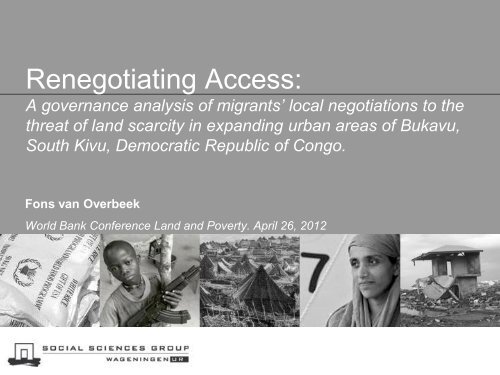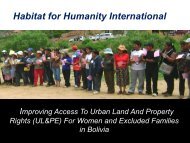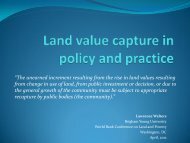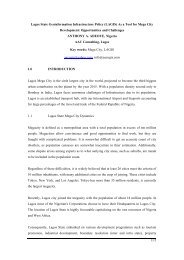PPT - World Bank Conference on Land and Poverty
PPT - World Bank Conference on Land and Poverty
PPT - World Bank Conference on Land and Poverty
You also want an ePaper? Increase the reach of your titles
YUMPU automatically turns print PDFs into web optimized ePapers that Google loves.
Renegotiating Access:<br />
A governance analysis of migrants’ local negotiati<strong>on</strong>s to the<br />
threat of l<strong>and</strong> scarcity in exp<strong>and</strong>ing urban areas of Bukavu,<br />
South Kivu, Democratic Republic of C<strong>on</strong>go.<br />
F<strong>on</strong>s van Overbeek<br />
<str<strong>on</strong>g>World</str<strong>on</strong>g> <str<strong>on</strong>g>Bank</str<strong>on</strong>g> <str<strong>on</strong>g>C<strong>on</strong>ference</str<strong>on</strong>g> <strong>L<strong>and</strong></strong> <strong>and</strong> <strong>Poverty</strong>. April 26, 2012
Recent insecurity in Eastern C<strong>on</strong>go has changed people’s<br />
l<strong>and</strong> access strategies in the city of Bukavu.<br />
Urban dwellers negotiate, forge alliances <strong>and</strong> compete for<br />
c<strong>on</strong>trol over l<strong>and</strong>.<br />
This dynamic created an envir<strong>on</strong>ment in which most<br />
households are exposed to <strong>and</strong> expect persistent <strong>and</strong><br />
systemic uncertainty.
What emerges is an envir<strong>on</strong>ment within which<br />
individuals seek to make deals with <strong>on</strong>e of the<br />
many local governance elites who have claimed<br />
ownership over l<strong>and</strong> management issues.<br />
Although restricted, urban dwellers often have some<br />
room for maneuver in order to gain (temporary)<br />
access to l<strong>and</strong> <strong>and</strong> housing
Research questi<strong>on</strong> which informed this paper:<br />
How do governance arrangements provide <strong>and</strong><br />
thwart room for maneuver in the accessibility of<br />
l<strong>and</strong> for new settlers in the periphery of Bukavu<br />
<strong>and</strong> how do the different strategies of (potential)<br />
l<strong>and</strong> users influence these governance<br />
arrangements?<br />
What follows are 3 cases to dem<strong>on</strong>strate how migrants<br />
use different strategies to gain access to l<strong>and</strong>.
Looking at local strategies to gain access to <strong>and</strong> c<strong>on</strong>trol over<br />
l<strong>and</strong> through such a governance lens is not intended to<br />
completely displace the focus <strong>on</strong> instituti<strong>on</strong>s, rights, <strong>and</strong><br />
the restricted agency of local people.<br />
But the paper tried to provide a more nuanced picture of how<br />
rule in l<strong>and</strong> governance circulates, <strong>and</strong> indeed, is changed<br />
by this circulati<strong>on</strong> (this duality is informed by Foucault’s<br />
‘governmentality’ framework)
Competiti<strong>on</strong> for l<strong>and</strong> in Bukavu seems to be poorly<br />
regulated due to :<br />
- social <strong>and</strong> ec<strong>on</strong>omic change;<br />
- c<strong>on</strong>tradictory public policies;<br />
- change in patr<strong>on</strong>age networks;<br />
- But especially..<br />
..a multiplicity of (competing) governance instituti<strong>on</strong>s.
Case I: ‘Working under the radar’<br />
Some migrant groups rather prefer to work ‘under the radar’<br />
of already present governance instituti<strong>on</strong>s.<br />
Villagers who have now come to live close to each other in<br />
the city have received support of church organizati<strong>on</strong>s,<br />
NGOs <strong>and</strong> local entrepreneurs but to no success.<br />
Their governance arrangements have not (yet) been densely<br />
regulated, but rather operate as a loosely c<strong>on</strong>structed<br />
underst<strong>and</strong>ing between people within the group.
What really c<strong>on</strong>stitutes these migrant groups? What<br />
do they do?<br />
It is neither geographical proximity nor a dense c<strong>on</strong>necti<strong>on</strong><br />
with fellow migrants that is of importance.<br />
Every household enjoys some (financial) support <strong>and</strong><br />
assistance when needed.<br />
But <strong>on</strong>e also needs to renew or c<strong>on</strong>firm the social c<strong>on</strong>tract.
How can ‘working under the radar’ still change<br />
instituti<strong>on</strong>al competiti<strong>on</strong> in peri-urban Bukavu?<br />
It has given a particular group of migrants more leeway to<br />
remain in c<strong>on</strong>trol over their l<strong>and</strong> without being c<strong>on</strong>stantly<br />
harassed by m<strong>on</strong>ey hungry government elites<br />
In some areas of peri-urban Bukavu the emerging<br />
governance arrangements of migrants seem to reduce the<br />
influence <strong>and</strong> claimed c<strong>on</strong>trol of local chefs.
Case II: Migrants’Patterns of Mobility, Trans-Local<br />
<strong>L<strong>and</strong></strong> Use <strong>and</strong> Hybrid Identities<br />
With the increasing fiscal <strong>and</strong> political pressure <strong>on</strong> traditi<strong>on</strong>al<br />
leaders in the villages customary instituti<strong>on</strong>s <strong>and</strong> social<br />
ties are put under stress.<br />
Migrants in Bukavu feel that they regularly need to renew<br />
their (social) c<strong>on</strong>tract, with traditi<strong>on</strong>al chiefs in the village.<br />
As a c<strong>on</strong>sequence governance practices from the villages<br />
reach into the city <strong>and</strong> vice versa.
Migrants who are regularly going back to the village have<br />
formed a specific locally embedded ‘hybrid’ identity.<br />
They c<strong>on</strong>tinually need to negotiate their roles <strong>and</strong><br />
expectati<strong>on</strong>s in order to secure access to governance<br />
arrangements <strong>and</strong> c<strong>on</strong>trol over their ‘family’ l<strong>and</strong>.<br />
In sum, it evolves as a result of the interacti<strong>on</strong> between<br />
governance arrangements of varying, overlapping <strong>and</strong><br />
interpenetrating service deliveries.
Case III: C<strong>on</strong>stucti<strong>on</strong> Anarchique<br />
Anarchistic c<strong>on</strong>structi<strong>on</strong> is always the result of transacti<strong>on</strong>s<br />
between authorities <strong>and</strong> residents.<br />
Many local authorities have been selling inappropriate public<br />
areas (roads, playing fields, bus stati<strong>on</strong>s, cemeteries, etc.)<br />
to make m<strong>on</strong>ey.<br />
‘C<strong>on</strong>structi<strong>on</strong> anarchique’ is encouraged by the government<br />
itself <strong>and</strong> this rati<strong>on</strong>ale is imitated by other instituti<strong>on</strong>s like<br />
the church <strong>and</strong> influential entrepreneurs.
Both nati<strong>on</strong>al <strong>and</strong> local government officials will not take<br />
away the stick with which they can hit their populati<strong>on</strong><br />
every now <strong>and</strong> then.<br />
C<strong>on</strong>structi<strong>on</strong> anarchique feeds the current political system,<br />
but also gives more maneuvering space to local residents<br />
of Bukavu to c<strong>on</strong>struct their house <strong>and</strong> live in the city<br />
when not much m<strong>on</strong>ey is available.<br />
Some governance rati<strong>on</strong>ales will not change easily,<br />
especially not when copied by other instituti<strong>on</strong>s:<br />
the status quo remains<br />
(however, migrants learned to adapt to it)
C<strong>on</strong>clusi<strong>on</strong> I<br />
Bukavu is becoming poorer <strong>and</strong> more unequal. It is evident<br />
that the l<strong>and</strong> governance arena in Bukavu is fragile <strong>and</strong><br />
transitory.<br />
The paper has focused <strong>on</strong> (restricted) agency of migrants.<br />
It does not mean that they always have the power <strong>and</strong><br />
opportunity to secure their livelihoods or the ability to<br />
really escape the ‘poverty trap’.
C<strong>on</strong>clusi<strong>on</strong> II<br />
Most of the variety of instituti<strong>on</strong>s that are involved in l<strong>and</strong><br />
management, or touch up<strong>on</strong> issues of access to l<strong>and</strong>, are<br />
not dedicated to the purpose or dependent <strong>on</strong> it in any<br />
functi<strong>on</strong>al way (migrant groups).<br />
Amid a plethora of instituti<strong>on</strong>s different people rely <strong>on</strong><br />
different instituti<strong>on</strong>s to support their claims to<br />
envir<strong>on</strong>mental goods or services, such as access to l<strong>and</strong>.<br />
For most activities they combine sets of claims supported<br />
by different instituti<strong>on</strong>s (hybrid identities).
C<strong>on</strong>clusi<strong>on</strong> III<br />
Many of these instituti<strong>on</strong>s are informal, <strong>and</strong> c<strong>on</strong>sist more in<br />
the regularized practices of particular groups of people<br />
than in any fixed set of rules (like seen in the case of<br />
c<strong>on</strong>structi<strong>on</strong> anarchique);<br />
As such they are also dynamic, changing over time as social<br />
actors alter their behavior (hybrid identities <strong>and</strong> affiliati<strong>on</strong>s)<br />
to suit new social, political <strong>and</strong> ec<strong>on</strong>omic circumstances.
As migrants in the periphery of Bukavu interact with<br />
each other <strong>and</strong> with local governance elites in the<br />
c<strong>on</strong>text of these negotiati<strong>on</strong> processes, their<br />
acti<strong>on</strong>s may, over time, serve to reproduce<br />
particular instituti<strong>on</strong>s…<br />
…but they may also serve to alter them, <strong>and</strong> thus to<br />
push instituti<strong>on</strong>ally influenced l<strong>and</strong> access (<strong>and</strong><br />
l<strong>and</strong> use) dynamics al<strong>on</strong>g new pathways.
Thank you for your attenti<strong>on</strong>!<br />
f<strong>on</strong>s.vanoverbeek@wur.nl









